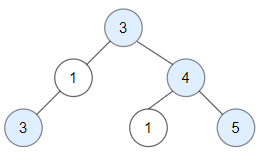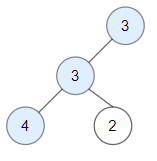Table of Contents
Problem Statement:
Count Good Nodes in Binary Tree LeetCode Solution:
Given a binary tree root, a node X in the tree is named good if in the path from the root to X there are no nodes with a value greater than X.
Return the number of good nodes in the binary tree.
Example 1:

Input:
root = [3,1,4,3,null,1,5]
Output:
4
Explanation: Nodes in blue are good. Root Node (3) is always a good node. Node 4 -> (3,4) is the maximum value in the path starting from the root. Node 5 -> (3,4,5) is the maximum value in the path Node 3 -> (3,1,3) is the maximum value in the path.
Example 2:

Input:
root = [3,3,null,4,2]
Output:
3
Explanation: Node 2 -> (3, 3, 2) is not good, because “3” is higher than it.
Example 3:
Input:
root = [1]
Output:
1
Explanation: Root is considered as good.
Constraints:
- The number of nodes in the binary tree is in the range
[1, 10^5]. - Each node’s value is between
[-10^4, 10^4].
Approach:
Idea:
- This problem can be solved using the iterative way and also the recursive way. Let’s look into the recursive way as it is easy.
- we will traverse the right subtree and left subtree recursive manner.
- Update the maximum value found while recursing down to the paths from the root to the leaves.
- If node value >= current maximum, we will increase our cnt value.
- When the node will be null we will simply end our recursion call.
- Total cnt will be our estimated answer.
Code:
Count Good Nodes in Binary Tree C++ Code:
class Solution {
public:
void Count(TreeNode* root,int &count,int maxi){
if(root==NULL) return;
if(root->val >= maxi){count++; maxi=max(maxi,root->val);}
Count(root->left,count,maxi);
Count(root->right,count,maxi);
return;
}
int goodNodes(TreeNode* root){
int count=0;
int maxi=root->val;
Count(root,count,maxi);
return count;
}
};Count Good Nodes in Binary Tree Java Code:
class Solution {
int cnt=0;
void rec(TreeNode root,int val)
{
if(root==null)
return ;
if(root.val>=val)
cnt++;
int k=Math.max(val,root.val);
rec(root.left,k);
rec(root.right,k);
}
public int goodNodes(TreeNode root) {
int val=Integer.MIN_VALUE;
rec(root,val);
return cnt;
}
}
Complexity Analysis of Count Good Nodes in Binary Tree Leetcode Solution:
Time Complexity:
Time complexity will be O(n). Where n is the number of nodes, we are visiting every node only once.
Space Complexity:
We are not taking any extra space. So, space complexity will be O(1).